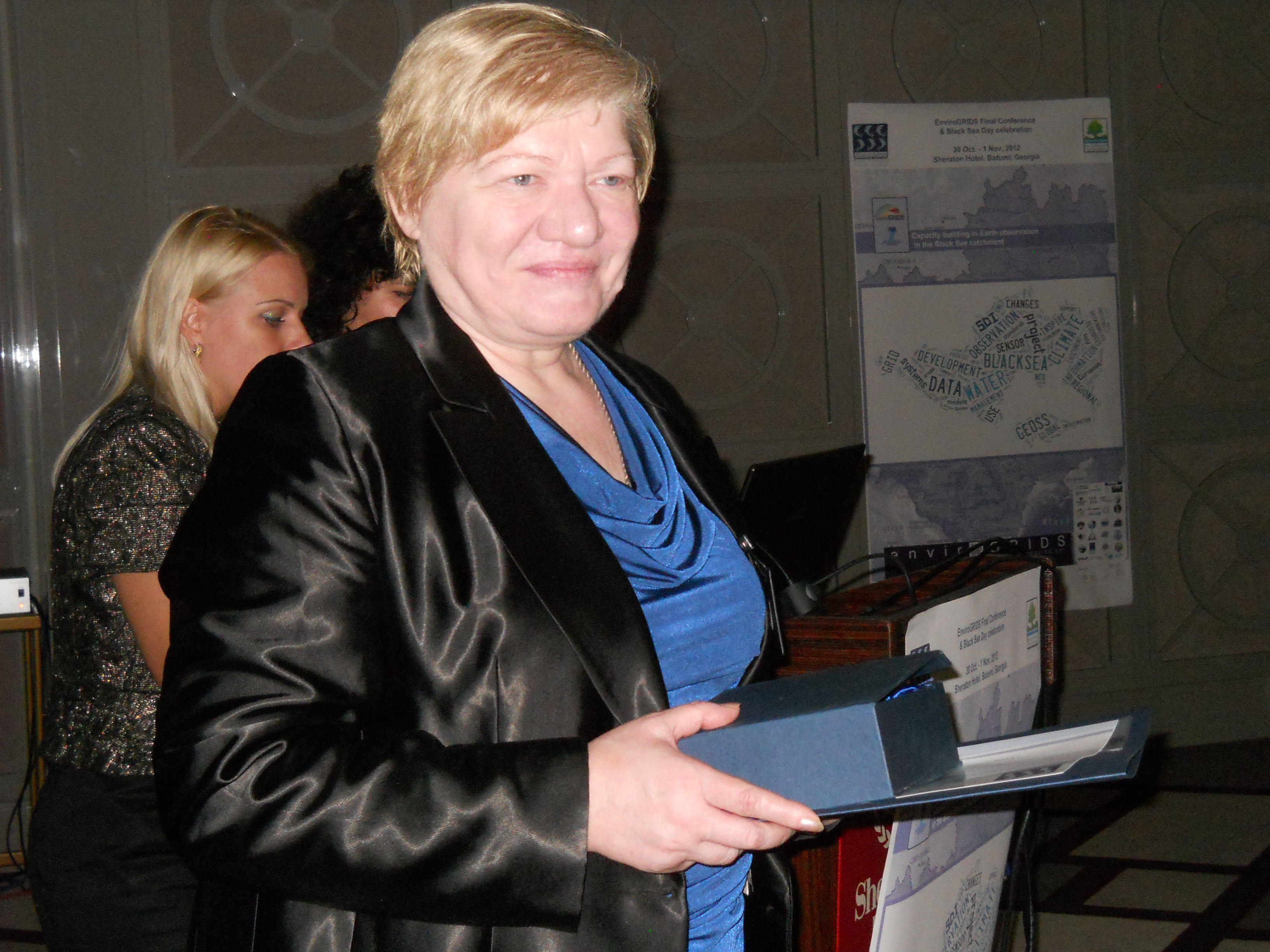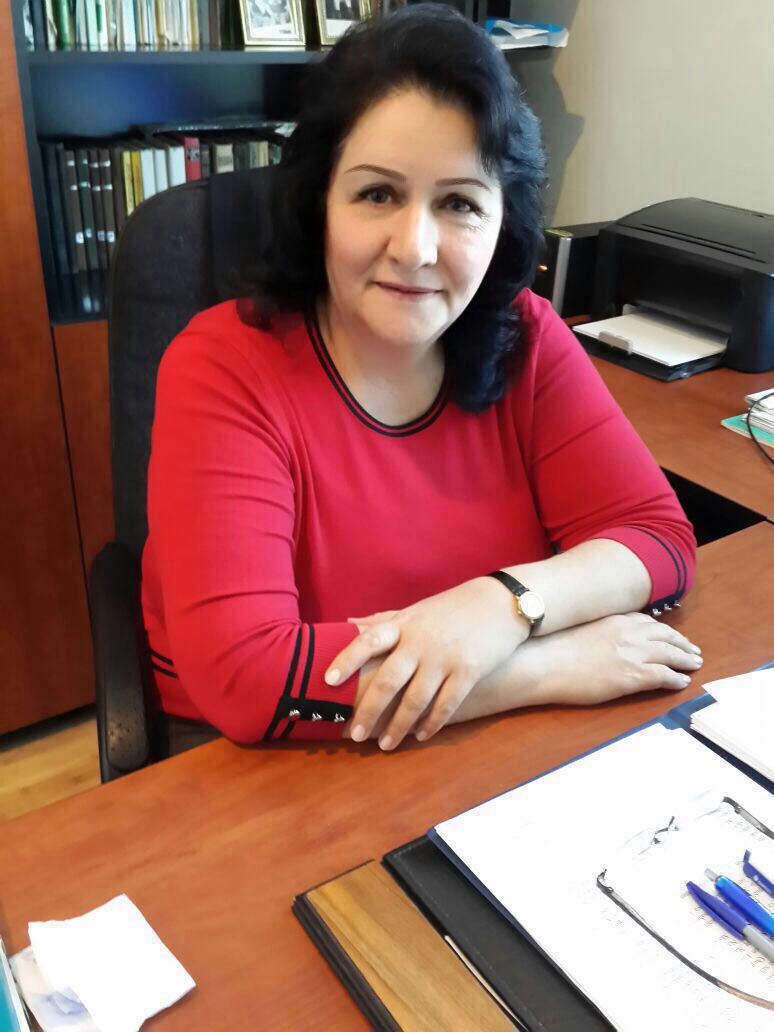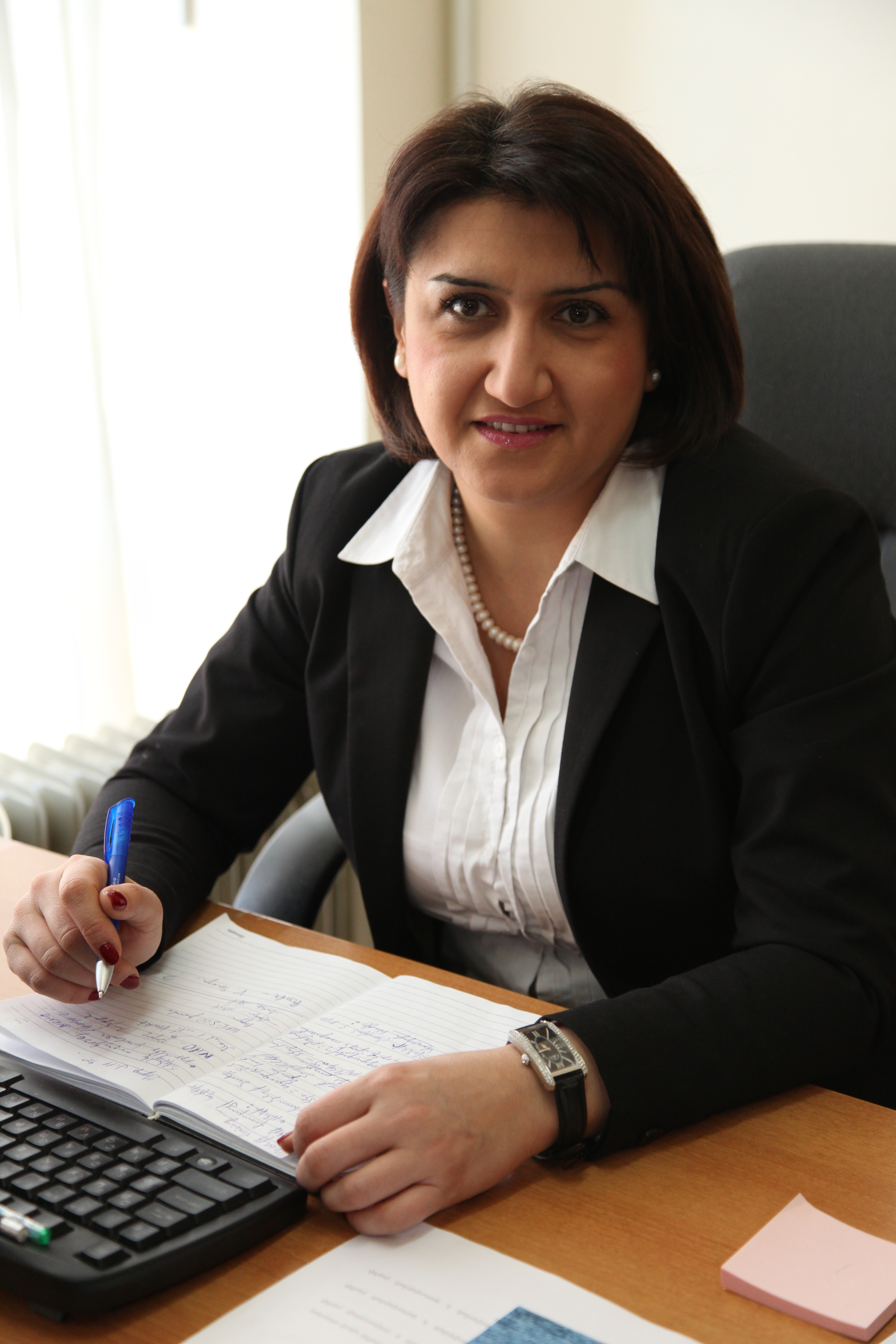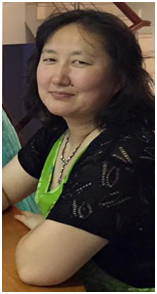
Ms. Mariam Makarova is the Deputy Head of the Department of Water Resources of the Ministry of Environment and Natural Resources Protection of Georgia. She deals with management and protection of water resources, development of policy in this area, as well with setting of priorities and development of laws and regulations.
What would you say are the main challenges in your work as a woman?
The issue of water resources management and protection is very important for Georgia. In this area, a lot of women are working, both in the public and non-governmental organizations. I think the problems are the same for both men and women, I don't feel gender discrimination.
What have you done to overcome these obstacles/challenges?
I have long been working in the water sector, immediately after graduation of the University. I could say that I dedicated my life to improvement of water management in Georgia. I worked a lot and with pleasure, that was for me a great moral satisfaction. My efforts get results.
What would you recommend to other women in similar situations (in the water world)?
Advice is only one: to be more active, to gather more knowledge and experience.

Ms. Matanat Avazova is a Deputy Director of the National Department on Environment Monitoring of the Ministry of Environment and Natural Resources of Azerbaijan. She is ecologist and deals with monitoring of environment quality including monitoring of air, precipitation, water and land resources as well as radiation. She is the national coordinator of the Helsinki Convention (Azerbaijan acceded to it in 2000). She is actively involved in the development of legal and by-laws in accordance with international and European requirements; participates in the preparation of the National Environmental Report Environment of the Republic.
What would you say are the main challenges in your work as a woman?
Frankly, that at my workplace there is no a gender problem. The main problem in the work - this is turnover of staff. Due to the lack of professional staff I have to solve many problems itself, but it takes a lot of time. For married women, it creates family problems. I am happy that my family supports me and understands. If you have a job you have problems. Note that the monitoring itself is very important for decision making and planning. Sometimes the budget do not allocate the amount that is needed. Then you cannot avoid reducing the work required. Modernization of the monitoring network is very crucial for us. In addition, there is another problem that is very sharp - the lack of national standards.
What have you done to overcome these obstacles/challenges?
I love my job and I get great pleasure from it. No wonder that 37 years of my life I have devoted to Environment sphere, especially to water. A love of work is very important to overcome obstacles. First of all, without stopping I raise my professional level by studying experience of advanced countries in water sector, participate in international seminars and conferences on water issues and management. I have accumulated a good experience. I began to implement this experience in my workplace. I prepared the highly skilled specialists. In recent years, the Government allocates more funds for development of water sector. But, of course, all by himself can not overcome all the difficulties.
What would you recommend to other women in similar situations (in the water world)?
I think the water is a need more for women than for men, and we know that water is a health and a peace. Only women have to deal with water resources management, of course, it is a joke, but it has some truth. It is needed to love profession and to be self-confident.

Ms. Gulara Mamedova, chief consultant of the department of science, projects, construction and foreign relations in JSC "Irrigation and Water Management" of Azerbaijan, 36 years of service.
What would you say are the main challenges in your work as a woman?
- Nowadays equality between men and women is stated in the legislation of Azerbaijan at all levels. Even in some areas of the social sphere, women have a number of benefits and advantages. That is the paid maternity leave, and the restriction on works that require physical strength, as well as a shorter working day for mothers with three or more minor children. But, nevertheless, at the present time there are certain difficulties in their career.
What have you done to overcome these obstacles/challenges?
- I try to demonstrate my best professional skills, follow all instructions and orders of administration in time and qualitatively. In order to increase my professional level I constantly improve my skills by self-education, as far as possible I go through training courses and participate in trainings on my profession.
What would you recommend to other women in similar situations (in the water world)?
- As an employee with a lot of experience, I advise women who work in the administrative sphere, be proactive, not timid in face of difficulties, always consult and listen to the advice of more experienced colleagues, to educate themselves, to keep abreast of new trends in the water sector, attend relevant courses and to participate in trainings.

Ms. Lusine Taslakyan, Deputy Head of the Water Resources Management Agency of the Ministry of Nature Protection of Armenia.

Ms. Musabaeva Kasiet, Chair of CWP-Kyrgyzstan.
What would you say are the main challenges in your work as a woman?
One of the main rivers in Central Asia region is the Syr Darya River, which is the source of the Naryn River that is formed by the confluence of the Big and Small Naryn in the mountains of Kyrgyzstan. I was born and raised on the shores of this river. Water - the source of human life, all over the world all living things are closely connected with water. Kyrgyzstan - the only country in Central Asia, where water resources are formed almost entirely on its own territory and this is its hydrological features and benefits. Kyrgyzstan has considerable water and hydropower resources, and it is one of its main resources. Water is necessary not only for drinking but also for cooking, for care of a livestock at the farm, for irrigation of crops, as well to meet the needs of personal care, and nursing, cleaning, washing and waste disposal. All these activities largely are correspond to women. Kyrgyzstan is one of the Asian countries where the observance of the most of established traditions is part of life. The barriers of traditions and customs are often difficult to transcend. In my country, men see water as an economic resource (irrigation water), and women - as a consumer resource (drinking water for domestic use). During the seminars, workshops and case studies I have had to face with an established world-view and custom: traditionally men's work is considered as a field processing by means of mechanization and irrigation, fishing, etc., and women's work is traditionally considered as a main responsibility for home and care for family members. However, along with this, the burden associated with domestic water use, treating the fields and gardens, etc. are entrusted to women. We can mention that in the history of Kyrgyzstan there were women who in difficult times, worked in the fields, and were engaged in irrigation. There was a woman - Zuurakan Kaynazarova, hero of labour, who was to regulate the intake of water from the source by using his own body to block a riverbed and to direct water into the second-order channel. As well as in other countries, the main causes of unequal access of men and women in Kyrgyzstan to water resources are low percentage of women in decision-making sphere; it also limits women's access to other natural resources. As we all know, one of 17 sustainable development goals adopted at the UN summit in 2015 is the achieving of gender equality, providing of all people with water and sanitation. These goals are developed to ensure real participation of women in political, economic and social life, creation of equal opportunities in the selection of candidates for senior positions, as well as the participation of women in decision-making.
What have you done to overcome these obstacles/challenges?
During the seminars, trainings for employees of Agriculture and Water Resources, and training of students, I try to put the emphasis on equal opportunities and gender equality, telling that the problem of gender is a social aspect, not a biological one. Also, I always and everywhere emphasize the importance of active involvement of women in various bodies dealing with management of water, land and irrigation systems. This will lead to a more equitable and efficient use of water resources (creation of water supplies, efficient use and regulation of water resources). In my daily activities and work in CWP-Kyrgyzstan, I came to the conclusion that the majority of women in Kyrgyzstan are vulnerable and not sufficiently protected in many areas: in the family, society, social and political life. There are many archaic stereotypes regarding the roles of women in society, which should be overcome through education, advocacy and legislative work at a national level. But it is important to note that Kyrgyzstan is the most advanced on the majority of indicators of gender equality in society in the region.
My principled approach: If I treat the water carefully and economically, my children, relatives, neighbors and friends will do the same, then society as a whole will have such an attitude to water!

Ms. Ospanbekova Gulshat, Head of the Tobyl-Torgaysky Basin Inspectorate on regulation of water resources use and protection of the Committee on Water Resources of the Ministry of Agriculture of the Republic of Kazakhstan. She deals with regulation of use, control and protection of water resources in the Tobyl-Torgaysky Basin in Kazakhstan.
What would you say are the main challenges in your work as a woman?
I have no problem, because I am perceived like an expert and not as a woman, and colleagues are working with me as with expert. I'm the only woman - the head of one of the eight basin inspectorates.
What have you done to overcome these obstacles/challenges?
I work in water sphere since 1982, and it proves I didn't face with problems because I am a woman.
What would you recommend to other women in similar situations (in the water world)?
A woman has to deal with family - it is her top-priority. Inspection is exactly a man's job, associated with permanent residency in the road, controlling water bodies.

Ms. Gulmira Imasheva, Head of the Department on water resources of the Ministry of Agriculture of the Republic of Kazakhstan. She deals with regulation of water resources in Kazakhstan.
What would you say are the main challenges in your work as a woman?
As a woman I don't encounter problems at work, at the Committee on Water Resources of the Ministry of Agriculture, I am the only woman - a Head of the department. I am a civil servant regardless of gender.
What have you done to overcome these obstacles/challenges?
No problems, I just work, improving non-stop my skills.
What would you recommend to other women in similar situations (in the water world)?
To work, work and work, constantly raise the professional level.

Ms. Battseren Tserendorj, Executive director, WaSH Action of Mongolia, member of Mongolian Water Partnership (a local NGO focusing on improving water safety, sanitation and environmental hygiene conditions in Mongolia). She is responsible for overall management of the organization.
What can you say about the main problems that you face in your work as a woman?
As a proud mother of 4 beautiful children, sometimes it is difficult to find a balance between work and personal life. There are a lot of things to do to improve water and sanitation conditions in Mongolia. Our organization and staffs are committed to change this situation. However as we are fighting for sustainability of our organization, often it needs an extra efforts which means less time for myself and my family.
What are you doing / have done to overcome these challenges / obstacles?
I have improved the management of the organization, such as sharing the duties and responsibilities among our staffs and having flexible working hours.